Papa Vinyard here, now here's a little somethin' for ya...
This column will tackle an Oscar winner from each year starting with the inception of the Academy Awards in 1929. My goal is to highlight lesser-known films from throughout cinema history that were able pull down one (or more) of the Golden Statuettes that remain such an integral part of Hollywood lore. I will also take a close look at the actual element(s) that the film was given awards for, with my analysis on how they hold up with years (or decades) of cinematic history in the rearview since. Today, I'll be starting with the first ever winner for Best Original Screenplay (then known as "Best Writing, Original Story"), UNDERWORLD. Next, I'll be jumping to 2013's Awards with SEARCHING FOR SUGAR MAN (which pulled down the statue for Best Documentary Feature), before going back to 1930, and then back again to 2012, and etc. etc. etc. as the King of Siam would say. If anyone has any lesser-known Oscar-winners they want to see covered, drop me a line on Twitter or in the comments below.
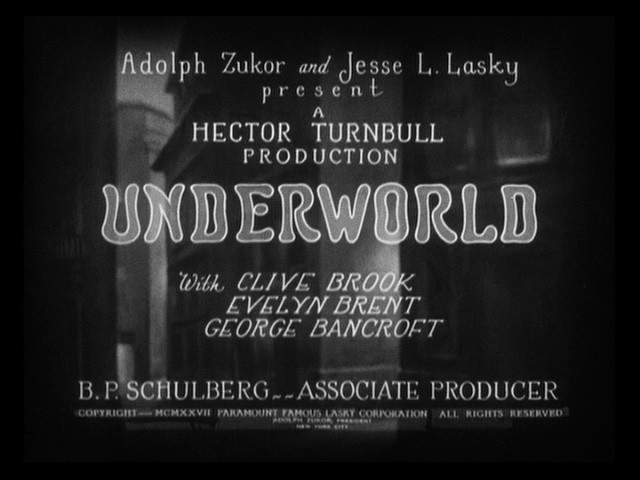
1927UNDERWORLD
This first professional film of Josef von Sternberg seemed unusually bold both in subject matter and in treatment at the time it was made.
A great city in the dead of night….streets lonely, moon-flooded….buildings empty as the cliff-dwellings of a forgotten age-
UNDERWORLD, in its current incarnation available on Criterion DVD, begins with these ominous titles that set up this precursor to the gangster films that would rise to prominence in the years immediately preceding the instatement of the Hays Production Code of 1934.
Writer Ben Hecht, who won his first Oscar for this film (the second was for THE SCOUNDREL in '36), would write another massively influential film in the genre five years later with the original Howard Hawks SCARFACE. Fellow writer Robert N. Lee, got his own Academy Award nomination in 1932 for Edward G. Robinson's starmaker, LITTLE CAESAR. Director Josef von Sternberg would helm two more proto-noirs with UNDERWORLD writer Charles N. Furthman and leading man George Bancroft, entitled THE DRAGNET (which also starred UNDERWORLD leading lady Evelyn Brent) and THUNDERBOLT, before returning to his native Germany, where he discovered Marlene Dietrich.
With these qualifications, you'd think that UNDERWORLD could serve as the prototype for the barrage of gangster flicks that followed, right? Well, sorta…
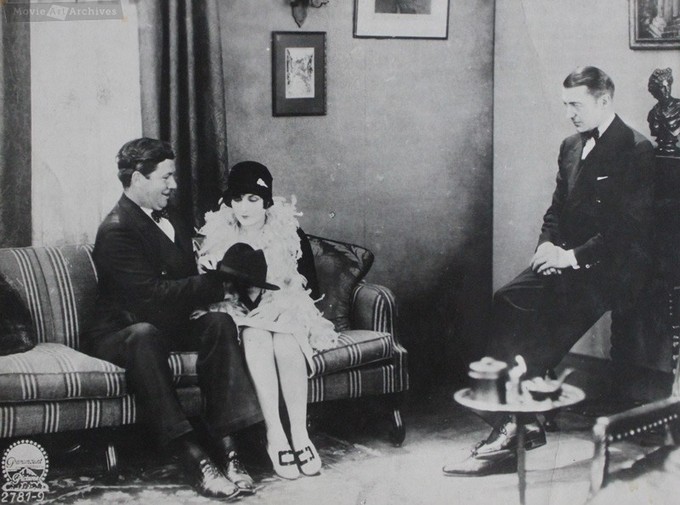
The narrative is primarily concerned with a love triangle between two hoods, nicknamed "Rolls Royce" (Clive Brook) and "Bull Weed" (George Bancroft), and Weed's main squeeze "Feathers" McCoy (Evelyn Brent). The first scene has Rolls drunkenly stumbling upon an explosive bank robbery and recognizing the thief as his former client from his lawyer days, Bull Weed.
First "line" of dialogue: "The great Bull Weed - closing another bank account."
Bull Weed hightails it out of there with Rolls in tow and after reminding his soused-up former lawyer not to squeal on him, he takes his old acquaintance to the local speak (remember, this is prohibition) and introduces him to his dame, Feathers. Bull gloats about his recent heist, getting the negative attention of local thug Buck Mulligan. After getting Rolls out of a scrape with Buck, Bull Weed decides to help clean the drunk up, and makes him his de facto sidekick.
When Buck aggressively tries to put the moves on Feathers, Bull Weed chases him down and kills him in a drunken rage. While Bull's serving time for his actions, Rolls and Feathers plan on breaking him out despite their developing romantic feelings. Unknowing of their plan, Bull breaks out of prison in a jealous rage, fully intending on hunting down and killing the two almost-lovers before the cops inevitably get to him.
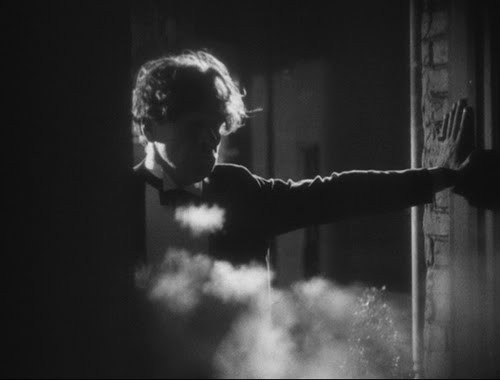
While it doesn't quite have the kind of story like the ones that would permeate crime films in years to come, the script has plenty of tropes that would pop up in gangster films later. Within the first 5 minutes, the theme of "honor-among-thieves" enters the narrative, and becomes a major element of the story. Bull Weed takes care of both Feathers and Rolls Royce, but demands their eternal loyalty in exchange. He is deeply contemptful of "squealers" (understandably so), and when he believes that Rolls and Feathers are two-timing him, it's enough to drive him on a suicide run to put the two in their graves even though his legal execution is imminent.
Visually, cues like the lavish, underground party, the use of arch shadows and key lighting, and the universal presence of brimmed hats would become staples of the genre. It doesn't really have the German Expressionism influence on its sleeve the way the noirs of a few years later would, but you can feel the heavy stylization creeping into the fringes of the frame. Bancroft's loud, boisterous gangster anticipates many classic cinematic criminals, including Ben Hecht's own Tony Camonte in SCARFACE (more on that later), while Evelyn Brent's confident performance as the strong-minded Feathers would set the blueprint for countless gangster molls to come. All this stuff became directly linked with the kind of film that UNDERWORLD set the precedent for, and it's interesting to see them in their primitive, as-yet-unexploited forms here.
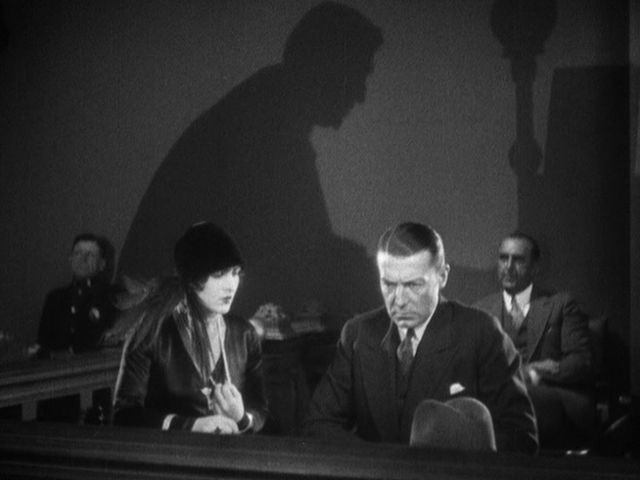
Not to say that certain aspects of the film haven't aged poorly. There was probably a different attitude towards crime and, specifically, gangster films back then than there would be even a couple of years later, so there's an awkward comedy element that is clearly intended to contrast with the more dramatic content of the film. Like if everyone in THE GODFATHER acted like Clemenza.
Certain lines cross right past the point of stylized gangster-speak right into the level of high camp. Example: there's a big, underground criminal party at about the halfway point and Bull Weed talks up the occasion, saying, "Everyone with a police record will be there!" At the party, a barker loudly yells to all incoming guests, "Check your gats!"
Worse than any one line is the character of Bull Weed's buddy, named "Slippy" Lewis, who acts as the comic relief for the film. Lewis is played by Larry Semon, an actor/filmmaker (who filmed the first version of WIZARD OF OZ 14 years before the Judy Garland version), and his character is mostly a pastiche of vaudevillian ticks and facial expressions, and plays no significant role in the film's plot. He's basically this film's version of John Turturro in the TRANSFORMERS series, going way too over the top and off point for laughs that don't land and that no one was really asking for to begin with. He's the fellow on the right trying really hard to seem interested in what he's seeing.
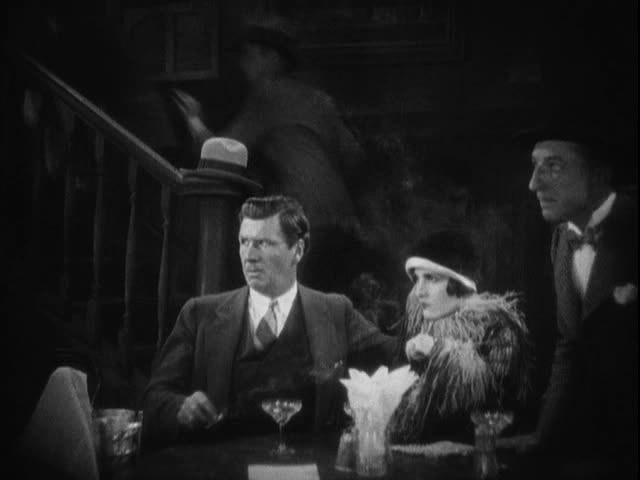
In general, the time that the film was made reflects heavily on almost all aspects of the thematic content. UNDERWORLD was in production in the midst of the "roaring twenties", where despite the Volstead Act (prohibition), booze and money flowed freely in the major cities. There is a definite sense of moral condemnation towards this free-spirited amorality, best exemplified in the treatment of the Rolls Royce character. When we first meet him, he's basically a nobody, self-admittedly, "A lawyer some of the time, drunk all the time". His sobriety is what gives him the change to make something of himself as Bull Weed's number two, and when the chips are down, like when Feathers initially shoots down his romantic advances, he dives right back into the bottle out of pitiful weakness.
As pathetic as Rolls Royce's drinking seems, you can tell by the way they depict Bull Weed that he's supposed to be the more grotesque of the two. His boastful nature and hot, raging temper directly bring about his downfall, while Rolls' sober, stone-faced devotion to this slightly-simple, but quite destructive stick-up man is presented as a positive quality. Additionally, the Hays Code-like ending has Bull Weed realizing the error of his ways, and sparing the lives of Feathers and Rolls before resigning himself to his mandated death by hanging.
The huge party scene is over-the-top in ways that rival the Lurhmann GREAT GATSBY, down to its obviously unforgiving tone. Crazy, manic dancing, streamers freaking everywhere, and of course, omnipresent drinking. It ends with a montage of close-ups of laughing, presumably criminal faces that kinda reminded me of the METROPOLIS dancing scene, visually expressing a rapturous overly-satisfied society of the undeserving.
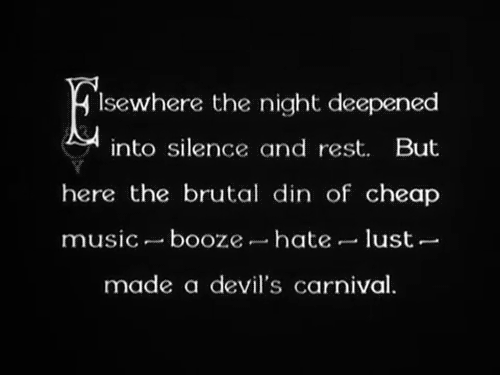
While UNDERWORLD arguably influenced a great many gangster films that succeeded it, there's a number of interesting overlaps between it and Hecht's own SCARFACE from five years later. Most glaringly, the relationship between the cocky, greedy Bull Weed and the steadfast, loyal Rolls Royce has elements of the Tony/Guino relationship from the latter film, down to the implosion of their friendship when the sidekick falls for someone his buddy has laid claim to (Bull's girlfriend here, Tony's sister in SCARFACE). Bull even says to Rolls at one point, "You may have the brains, but I've got the guts!", a line that could just as easily be found in either incarnation of SCARFACE.
The only thing that is kind of directly lifted from the first film to the second is a moment where Bull Weed, boasting about his success as a career crook, points to a large sign with the words, "THE CITY IS YOURS" spelled out in lights. The intent and effect of the bit is the same as the "THE WORLD IS YOURS" scenes in both SCARFACEs, but it's really hammered home here with Rolls Royce judgementally commenting off to the side, "Attila, the Hun, at the gates of Rome."
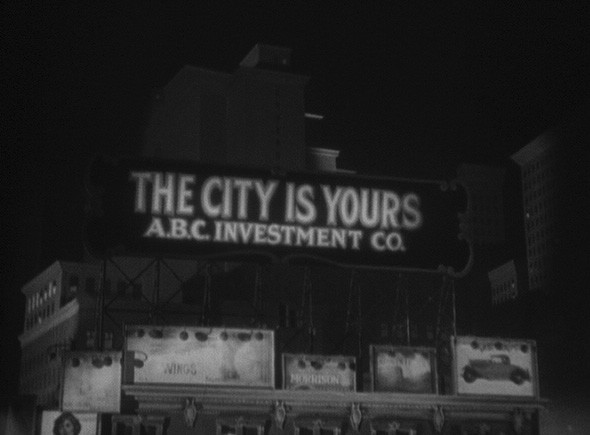
Thankfully, the slapstick and "endearing" stuff in UNDERWORLD is absent in SCARFACE: the latter film's criminals are opportunistic, violent, and self-serving and are probably beyond redemption, unlike Bull Weed and Rolls Royce. Late in UNDERWORLD, Bull Weed has a last stand with the police that's very similar to Tony's climactic scene, but rather than go out in a hail of gunfire, Bull realizes the error of his ways and resigns himself to his legally-mandated fate.
I suppose Hecht, when setting out to write SCARFACE, learned the error of his ways, and decided that the audience could handle, and may even embrace a more unabashedly hatable criminal instead of a charming, morally-conflicted one; history, which has thrown a remake and everlasting love at Hecht's later gangster picture while leaving the one that won him an Oscar in relative obscurity (aside from the Criterion release), has proven him right. The central gangsters in both UNDERWORLD and SCARFACE go down hard, but in my opinion, there was an evolution in Hecht's attitude towards portraying doomed anti-heroes, and the subleties and decrease in judgemental attitude in the latter film makes for more intriguing cinema.
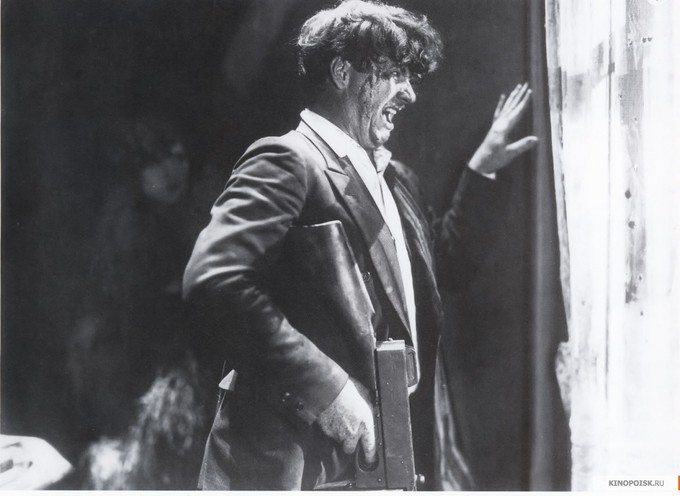
Interestingly enough, Hecht was disappointed in the quality and financial prospects of the finished film and tried to take his name off the credits. He settled for a "Story by" credit, with the "Screen play" credit going to Robert N. Lee alongside "Adaptation by Charles Furthmann" and "Titles by George Marion, Jr." Hecht was the only one of the four to be recognized by the Academy for his contribution to the film. Considering how messed up WGA arbitration can be today, this isn't hard to believe, but considering that the Academy ignored credits that were literally onscreen, I'd say three guys got the short end of the stick with that call.
Is this a script that, in and of itself, screams for Academy recognition? Well, in my 2013 opinion, no, but it had such an impact on the tradition of gangster films that followed that it's not inconceivable that the film played so well in 1927 that it played a part in the boom of the genre. Hecht (along with Lee, Furthmann, and Marion, Jr.) earned his Oscar just as much for his contribution to the rough sketchwork for pictures about the titular UNDERWORLD as he did for anything else. I guess that's one job of the Academy of Motion Picture Arts and Sciences: to recognize not only what had a major impact in that particular year, but what has left an indelible mark on cinema that will advance the medium in a way that builds a greater universal understanding of its potential.
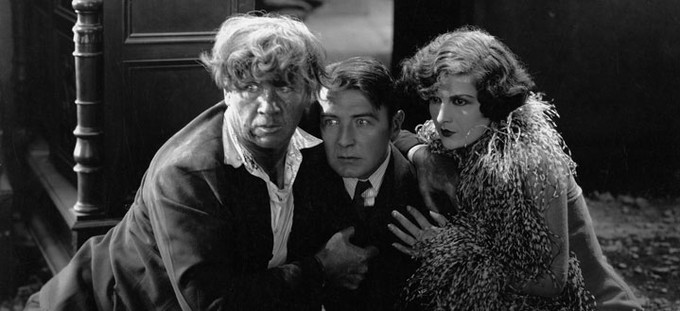
-Vincent Zahedi
”Papa Vinyard”
vincentzahedi@gmail.com
Follow Me On Twitter
